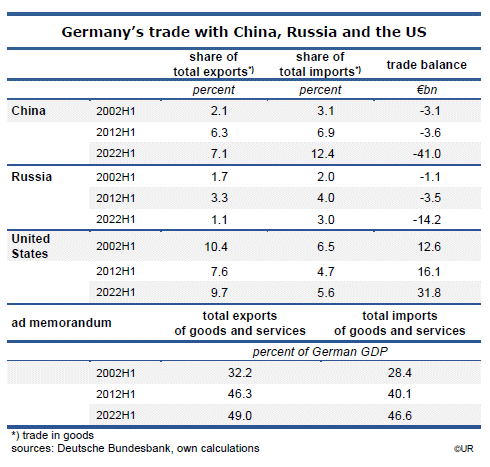Dieter Wermuth, Economist and Partner at Wermuth Asset Management
Impressed by unusually high inflation rates, media and politicians worry that the economy and the standard of living have become too dependent on Russia. As we will learn between now and next spring, cutting the Russia connection needs money and some time, as any major structural change, but it is a problem that the market economy can solve quite easily.
At the end of the day, the Russian dictator will no longer be able to extort Germany and the other European countries by manipulating the gas supply. Just the opposite of what he may initially have hoped for will happen: the EU will emerge as a more unified entity, the renewable energy sector will experience a new boom, with many additional jobs, and a further reduction of CO2 emissions. Moreover, Germany’s net capital imports from Russia are likely to reach 30 billion euros this year – in the balance of payments this is the accounting off-set of the bilateral current account deficit.
Russia, meanwhile, remains rather poor, given its generous endowment with natural resources. It is stuck in the commodity trap typical of many medium-income developing countries and still depends very much on the violent ups and downs of the world market prices for oil and gas. It has missed the opportunity to put its economy on a broader footing when the going was easier than today. Russia reminds me of Mephistopheles who had mischievously tried to wreck things but, after all had been said and done, had to admit that “(I am a) part of that force which, always willing evil, always produces good.” Russia has created one of the crises which the EU seems to need for further integration.
Germany’s dependence on China is an altogether different matter. In the first six months of 2022, goods exports to China were 7.1% of total exports, compared to Russia’s share of just 1.1%. If the decades-old trend continues, China will be, before the end of the decade, the main non-European destination of German exports, ahead of the US. China’s share in German imports has meanwhile reached 12.4%, compared to Russia’s 3.0% – the explosion of gas and oil prices has not changed the fact that Germany imports four times more from China than from Russia.
From an economic point of view, a war between the West and China would have much more serious consequences than Russia’s invasion of Ukraine. The whole value-adding process would be affected, including the all-important high-tech sector. Substituting sophisticated products is significantly more difficult than substituting gas and oil. For readers who understand German I recommend in this regard a recent detailed analysis by Jürgen Matthes of the Cologne Institut der deutschen Wirtschaft.
A common complaint in the press is that German firms continue to grow aggressively their direct investments in China, at the expense of domestic capital spending. A closer look shows that the situation is actually totally different: on a net basis, Germany has imported no less than 41 billion euros of Chinese capital in the first half of 2022, the equivalent of 2.2% of GDP.

The bottom line is that the division of labour between China and Germany (as well as the OECD region as a whole) has become more and more intensive and clearly benefits both sides. A war with the US and the rest of the West, possibly triggered by China’s attempt to conquer Taiwan, would have much more catastrophic consequences than the present economic war with Russia. Let’s hope that China’s government won’t ever find a pretext for irrational military adventures.
###
For more information please contact:
Instinctif Partners
Lars Hofer
E lars.hofer@instinctif.com
T +49 162 562 8917
Visit us: https://wermutham.com/
Follow us on Twitter and LinkedIn
About Wermuth Asset Management
Wermuth Asset Management (WAM) is a Family Office which also acts as a BAFIN-regulated investment consultant.
The company specializes in climate impact investments across all asset classes, with a focus on EU “exponential organizations” as defined by Singularity University, i.e., companies which solve a major problem of humanity profitably and can grow exponentially. Through private equity, listed assets, infrastructure and real assets, the company invests through its own funds and third-party funds. WAM adheres to the UN Principles of Responsible Investing (UNPRI) and UN Compact and is a member of the Institutional Investor Group on Climate Change (IIGCC), the Global Impact Investing Network (GIIN) and the Divest-Invest Movement.
Jochen Wermuth founded WAM in 1999. He is a German climate impact investor who served on the steering committee of “Europeans for Divest Invest”. As of June 2017, he is also a member of the investment strategy committee for the EUR 24 billion German Sovereign Wealth Fund (KENFO).
Legal Disclaimer
The information contained in this document is for informational purposes only and does not constitute investment advice. The opinions and valuations contained in this document are subject to change and reflect the viewpoint of Wermuth Asset Management in the current economic environment. No liability is assumed for the accuracy and completeness of the information. Past performance is not a reliable indication of current or future developments. The financial instruments mentioned are for illustrative purposes only and should not be construed as a direct offer or investment recommendation or advice. The securities listed have been selected from the universe of securities covered by the portfolio managers to assist the reader in better understanding the issues presented and do not necessarily form part of any portfolio or constitute recommendations by the portfolio managers. There is no guarantee that forecasts will occur.
Read the full article in PDF format here: English.
